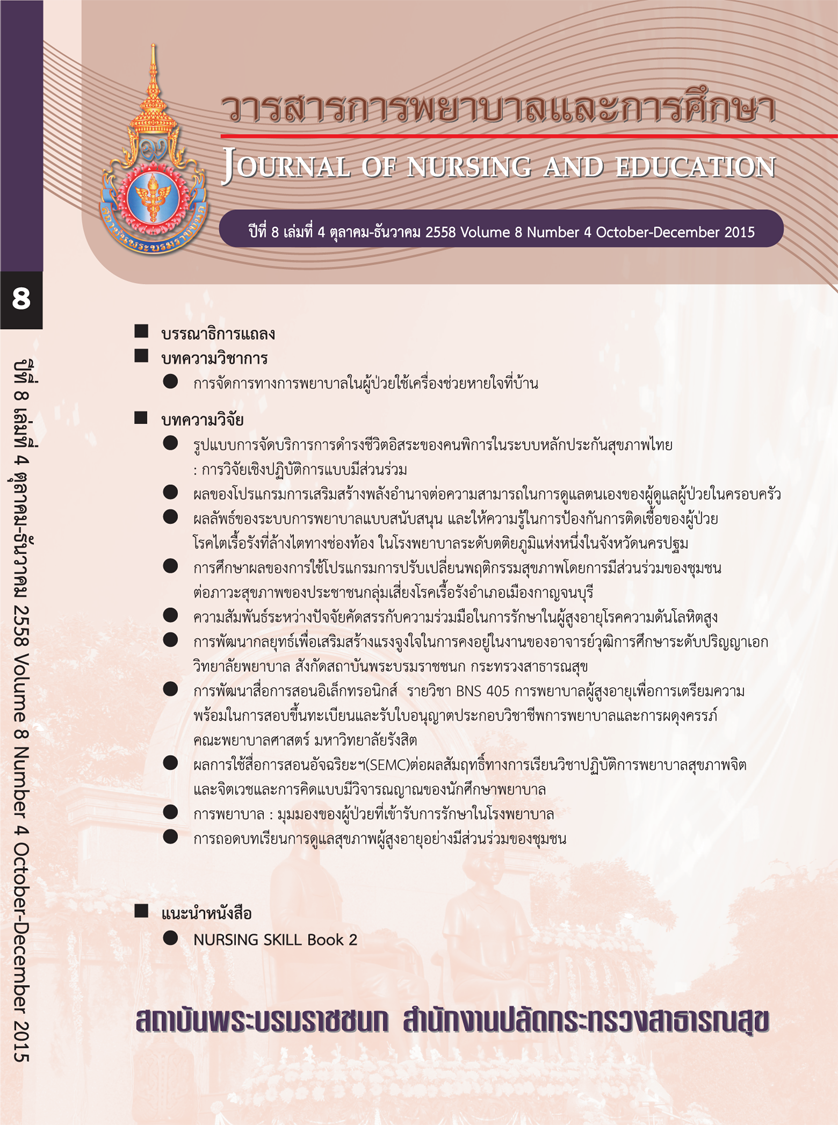รูปแบบการจัดบริการการดำรงชีวิตอิสระของคนพิการในระบบหลักประกันสุขภาพไทย : การวิจัยเชิงปฏิบัติการแบบมีส่วนร่วม; The Model of Independent living services for persons with disabilities in Thai National Health Security System : A participatory action research
คำสำคัญ:
คนพิการ, รูปแบบการจัดบริการการดำรงชีวิตอิสระ, ระบบหลักประกันสุขภาพไทย, การวิจัยเชิงปฏิบัติแบบมีส่วนร่วม, Persons with disabilities, Model of independent living services, Thai National Health Security System, Participatory action researchบทคัดย่อ
บทคัดย่อ
การวิจัยเชิงปฏิบัติแบบมีส่วนร่วมนี้มีวัตถุประสงค์เพื่อพัฒนารูปแบบการจัดบริการการดำรงชีวิตอิสระของคนพิการในระบบหลักประกันสุขภาพไทย การดำเนินการวิจัยแบ่งเป็น 2 ระยะ คือ ระยะที่ 1 การพัฒนารูปแบบฯ และระยะที่ 2 การทดลองใช้รูปแบบฯ กลุ่มตัวอย่างถูกเลือกแบบเจาะจง ประกอบด้วย คนพิการที่มารับบริการในหน่วยบริการสุขภาพหลัก (โรงพยาบาล) และหน่วยบริการร่วม (ศูนย์ดำรงชีวิตอิสระ) ที่เป็นคู่สัญญาจำนวน 14 พื้นที่ระหว่างเดือนสิงหาคม พ.ศ. 2555 ถึงเดือนกุมภาพันธ์
พ.ศ. 2556 จำนวน 33 คน ญาติผู้ดูแลคนพิการที่บ้านจำนวน 47 คน บุคลากรผู้ให้บริการในหน่วยบริการหลัก จำนวน 58 คน และบุคลากรผู้ให้บริการในหน่วยบริการร่วม จำนวน 73 คน เก็บรวบรวมข้อมูลแบบผสมผสานทั้งเชิงคุณภาพและเชิงปริมาณ โดยใช้แนวคำถามการสนทนากลุ่ม แบบสัมภาษณ์เชิงลึก
แบบประเมินความสามารถพื้นฐานการดำรงชีวิตอิสระแบบองค์รวมของคนพิการ แบบประเมินการรับรู้คุณค่าในตนเองของคนพิการ และแบบประเมินความพึงพอใจต่อบริการของคนพิการ ญาติผู้ดูแล และบุคลากร วิเคราะห์ข้อมูลโดยวิเคราะห์เชิงเนื้อหา และวิเคราะห์สถิติเชิงพรรณนา
ผลการศึกษาได้รูปแบบการจัดบริการการดำรงชีวิตอิสระของคนพิการในระบบหลักประกันสุขภาพ
ที่มีประสิทธิภาพ ส่งผลให้คนพิการมีความสามารถขั้นพื้นฐานในการดำรงชีวิตอิสระและรับรู้คุณค่า
ในตนเองดีขึ้น โดยคนพิการ ญาติผู้ดูแล และบุคลากรทั้งหน่วยบริการหลักและหน่วยบริการร่วมมี
ความพึงพอใจต่อการใช้รูปแบบฯในระดับมาก ข้อเสนอแนะจากการวิจัย หน่วยบริการสุขภาพหลักและหน่วยบริการร่วมสามารถประยุกต์รูปแบบการจัดบริการการดำรงชีวิตอิสระของคนพิการไปใช้ในการดำเนินงานส่งเสริมการดำรงชีวิตอิสระคนพิการตามระบบหลักประกันสุขภาพ เพื่อช่วยพัฒนาคุณภาพการจัดบริการ ซึ่งจะทำให้เกิดผลลัพธ์ที่ดีต่อคนพิการ และญาติผู้ดูแลต่อไป
คำสำคัญ : คนพิการ รูปแบบการจัดบริการการดำรงชีวิตอิสระ ระบบหลักประกันสุขภาพไทย
การวิจัยเชิงปฏิบัติแบบมีส่วนร่วม
Abstract
This participatory action research aimed to develop National health security
independent living model for persons with disabilities (PwD). The research process composed of 2 stages including Stage 1 the model development and Stage 2 the model experiment. Thirty-three PwD who visited the 14 co-operated independent living service centers (hospitals and IL centers) from September 2012-February 2013, 47 family
caregivers, 58 health personals from the main healthcare service centers, and 73 disabled care workers from the co-operated service centers were selected by purposive sampling to participate in the study. Mixed methods (qualitative and quantitative data) were
performed to collect the data using focus group questionnaire, in-depth interview,
the holistic fundamental independent living ability questionnaire, the self-esteem questionnaire, the service satisfaction questionnaire for PwD, family caregivers, health personals, and disabled care workers. Content analysis and descriptive statistics were used to analyze the data.
The findings of the study revealed that the National health security independent living model for PwD was effective strategy to enhance positive outcomes including: holistic fundamental independent living ability and self-esteem among PwD. Moreover, service satisfaction was presented by PwD, family caregivers, health personals, and disabled care workers at high level.
This results suggest that the National health security independent living Model is essential strategy to apply in practice, as a part of health care service system, in order to provide greater positive outcomes among PwD and family.
Keywords : Persons with disabilities, Model of independent living services,
Thai National Health Security System,
Participatory action research






